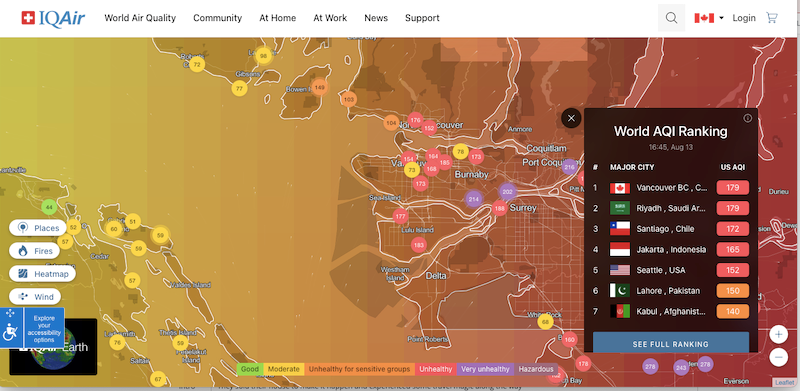Metro Vancouver issued an Air Quality Advisory for the region and the Fraser Valley Friday (Aug. 13) morning stating that high concentrations of fine particulate matter are expected over the next few days.
The advisory notes that outflow winds are bringing the smoke into the region, which is contributing "to elevated fine particulate matter concentrations and hazy skies."
And as of 4:45 p.m. Friday, the IQAir interactive air quality map ranks Vancouver as the worst major city in the world for air quality.
The company notes that the "PM2.5 concentration in Vancouver BC air is currently 10 times above WHO exposure recommendation" and that people should close their windows, wear masks, use air purifiers, and avoid outdoor exercise.
Vancouver has a US AQI of 179 or "Unhealthy." This ranking is matched only by Riyadh in Saudi Arabia.
Within B.C., several cities have higher AQI's than Vancouver. Lumby's has a US AQI of 432 while Vernon has one of 401. West Kelowna's is 372 and Peachland's is 365.
Tips for the heat wave and air quality advisory
Metro Vancouver notes that people with chronic underlying medical conditions or acute infections such as COVID-19 should postpone or reduce outdoor physical activity until the advisory is lifted, especially if breathing feels uncomfortable.
Exposure is particularly a concern for people with underlying conditions such as lung disease, heart disease, chronic obstructive pulmonary disease (COPD) including bronchitis and emphysema, as well as asthma, and/or diabetes; individuals with respiratory infections such as COVID-19; pregnant women and infants; children; outdoor workers (e.g. construction and agricultural workers); and older adults. Individuals who are socially marginalized may also be at elevated risk (e.g. people who are experiencing homelessness or are underhoused).
The hot weather is increasing the potential for heat-related illnesses, too. You should drink plenty of water even before you feel thirsty and stay in a cool place.
Indoor spaces with HEPA air cleaner filtration and air conditioning may offer relief from both heat and air pollution, but please observe any COVID-19 protocols. Consider creating a comfortable space at home with a portable air conditioner (if you do not have central air conditioning).
Check on older family, friends and neighbours. Make sure they are cool and drinking water
If you are experiencing symptoms such as chest discomfort, shortness of breath, coughing or wheezing, seek prompt medical attention. Call 9-1-1 in the case of an emergency.



